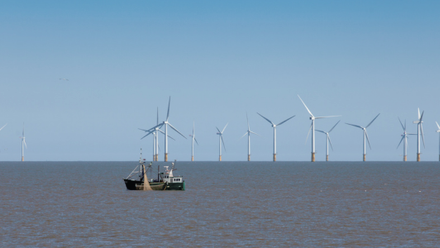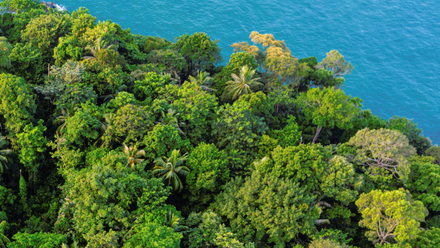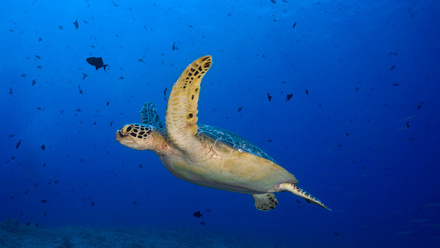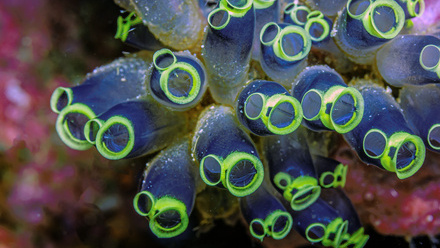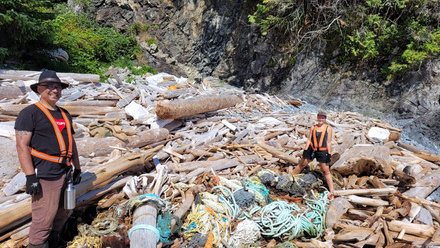Illegal fishing in the Galapagos
Journalists Chris Arsenault and Philippe Le Billon take us through the making of their story that has won the 2023 award in honour of the late Kevin Tester, the IMarEST's former technical advisor and marine journalist.

Chris Arsenault joined CBC News in Toronto after a decade as a foreign correspondent with Al Jazeera and the Thomson Reuters Foundation in South America, Europe and the Middle East.
Congratulations on winning the Kevin Tester Award for Marine Journalism. When did you start writing professionally?
Chris: I started young, publishing my first newspaper feature when I was 15. My mum was a reporter in Halifax, Canada, so I got much of my early journalism education at the kitchen table, grabbing mum glasses of brandy as she took a red pen to poor writing, bad grammar and wasted words. The "everybody gets a trophy" attitude pervading many postsecondary schools these days wasn't an issue in the Arsenault house; that early hands-on education helped immensely. After that first publication, I knew I wanted to be a reporter and haven't looked back since.
Philippe: I started in my early 20s, helping to launch an independent newspaper in Cambodia, and for environmental organisations before turning to more academic work.
Why did you write this story?
There's been plenty of coverage on illegal fishing, including around the Galapagos. But we didn't just want to flag the problem; that's been done. We wanted to drill down on possible solutions and get the view from the ground (or water in this case) on whether new technologies are making a difference.
What did you want readers to take away from the article?
Trying to make international news meaningful to audiences is never easy. The Galapagos Islands, however, have special resonance with people who might not care about illegal fishing in other environments.
We wanted this journalism to go beyond "there is a problem in country X and that's terrible, but what can I do about it?" to something more fulsome, probing possible solutions. Good people across sectors are trying, and in some cases making headway, in addressing the problem. We wanted to note the progress and where efforts are still falling short.

Philippe Le Billon is Professor at the School of Public Policy and Global Affairs (SPPGA) and the Department of Geography at the University of British Columbia.
What inspired you as you were researching the piece?
The cross section of characters we met from completely different backgrounds, all applying their skills and experiences to stop illegal fishing, were probably the biggest inspiration.
The hard-nosed former submarine commander who's now applying naval discipline to tracking illegal operators at sea; computer whizzes developing open-source tracking tools (and freely sharing their data), aerospace engineers turning high-powered satellites towards conservation, mothers feeling reassured by the technology telling them where their sons were fishing, and local fishermen flagging suspicious activity while just trying to make a living amid declining stocks. These characters made the story inspiring.
What challenges did you encounter?
Sources across the spectrum were generally happy to engage. Getting comments from Chinese officials, unfortunately, didn’t happen. But that’s not entirely surprising.
What have you personally taken away from the story?
Governments are starting to wake up to the dangers of illegal fishing. But the places most impacted need technology and resources. Enforcement is difficult; taking on these modern-day pirates is a cat and mouse battle. And geography favours the criminals.
Will you return to this story again in the future?
Chris: I think we will both be covering illegal fishing and other bad behaviour in the natural resources sector. I don't know if either of us will be back to the Galapagos Islands soon, but hopefully there will be some follow-up reporting before too long.
Philippe: Yes, I am collaborating with ocean defenders in the region trying to protect marine ecosystems and support small-scale fishing livelihoods.
What are you working on at the moment?
We just submitted an academic study on China's distant water fishing fleet in Latin America, drawing from the reporting in Ecuador, to the journal Marine Policy. That will be published shortly, and it's a nice linking of Chris's reporting skills with Philippe's scholarly analysis, along with research from our colleague Isabella Montecalvo and Argentinian expert Milko Schvartzman.
We're lucky to receive support from the Social Sciences and Humanities Research Council through the Global Reporting Centre at the University of British Columbia, which runs an initiative pairing journalists and academics to delve deeply into a story.
Hopefully we will be doing more collaborations like this in the future around topics including natural resources and the green energy transition, water governance, carbon markets and, of course, illegal fishing.
Any parting words?
Our fundamental job as journalists is to make complicated issues digestible and engaging for general audiences. We want our work to be worthwhile for a nurse checking the news before a 12-hour shift, the student who is trying to make sense of the world, the engineer who likes to keep up with what's happening internationally despite major project deadlines or the truck driver scanning the headlines at a rest stop. It must also resonate with decision-makers seeing how their efforts, or lack-thereof, are being interpreted by the broader public.
Walking this line between using common language to explain complex subjects, while still getting the facts right, is tough. Good journalists make it look easy. But everything from deciding what data and voices to include in a piece, to designing graphics and framing a narrative that's insightful for audiences, balanced, and accurate, takes effort.
Winning this award from the IMarEST is gratifying because it means the world's leading authorities on maritime issues enjoyed the reporting, and felt we did the subject justice. If you can engage both the experts and the broader public, that’s the mark of good reporting, and we are humbled to be recognised for it.
To fight illegal fishing in the Galapagos, Ecuador turns to Canadian satellite and sensing technology was written by Chris Arsenault and Philippe Le Billon for CBC News in June 2022.
Learn more about the IMarEST's Kevin Tester Award for Marine Journalism and read about Alex Christian who received the inaugural award last year here.

